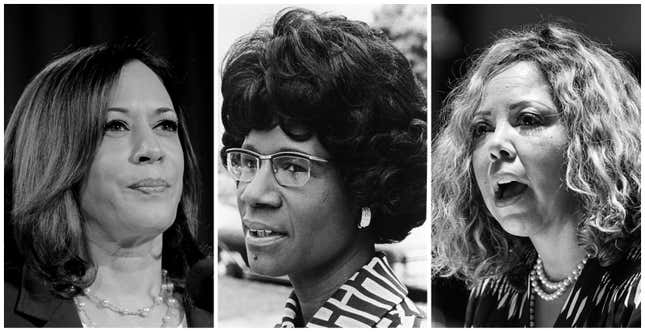
My Fellow Black Women,
It’s a new day. A Black, South Asian woman is the vice-presidential candidate on the 2020 Democratic ticket. It’s a historic moment. With the celebration, discussion and dissection of partisan politics, I reminisce on the countless strides made by the thousands of Black women who laid the groundwork for this moment.
But first, I take a moment for myself—and encourage you to do so, too. In honor of Labor Day and our literal work to improve our democracy, be gentle to yourself, and be kind. It is your genius that has gotten to where we are today. Know that you have always been a key leader of the caring culture of our country.
I think of my Delta Sigma Theta sisters and their public debut at the Suffrage March in the last century. On March 3rd, 1913, these strong women worked for a greater good but were segregated to the back of the procession by the white organizers. True to form, they were not discouraged. My sisters knew the value in the work they were doing, and they knew it would make an impact for all women and for themselves as Black women, albeit in the distant future.
For Black women, it’s always about the common good first. It’s about ensuring that young women know they have a place at the table in our democracy. It’s about our children playing in safe environments and having access to high-quality education. It’s about securing funding for a new small business or taking care of our parents in old age. Ultimately, it’s about equity for all within our great country.
If you look at the history of the United States, Black women have been present every progressive step of the way. A monumental driving force, Shirley Chisholm was the first Black woman elected to the United States Congress. She succeeded in getting unemployment benefits extended to domestic workers and introduced a program called SEEK (Search for Education, Elevation and Knowledge), which provided disadvantaged students the chance to attend college. Congresswoman Chisholm didn’t stop. She then went on to become the first Black woman to run for president.
Then, I think of Coretta Scott King, an activist long before marrying her husband, and an activist long after his assassination. She worked for policy change in regard to poverty and unemployment. She co-founded and led the Full Employment Action Council and the National Committee for Full Employment. Because of her, we have the Humphrey-Hawkins Act, a law that charges the government with the responsibility of striving towards and maintaining full employment.
More recently, I think of Congresswoman Lucy McBath. After her son, Jordan Davis was shot and killed in 2017, she joined Moms Demand Action for Gun Sense in America as a national spokeswoman. She continued to use her voice—advocating against gun violence while running for office, challenging the Georgia incumbent in the 6th congressional district for the United States House of Representatives. And she won.
McBath’s victory was described as the biggest upset of the 2018 midterms. She was the first Black woman to represent her district, and that very same midterm election, five Black women were elected to Congress. Five.
Black women have never needed a formal stage to express their desires for progress. We have taken to parks, marches, churches, book clubs, PTA meetings, and many other venues to champion for a better tomorrow. No matter the barriers created, nothing will dishearten Black women’s desire for change, and their gaze steadily remains on what a better, future America could look like.
I won’t ignore the fact that much of what we do has been out of necessity—that we are required to show up in extraordinary ways so we do not go ignored and can demand the change we need most. The battle is exhausting.
As we head towards the November election, I will remind you that taking care of yourself is an act of resistance, and necessary as we continue our work. Not only is this about Nov. 3, the special Senate election in January, and the municipal elections of 2021, it’s about bending the long arc of the moral universe towards justice and freedom.
My fellow Black women, as we embrace that one of our own will stand on our nation’s biggest stage to express her idea of what a future America could look like, I encourage you to breathe and take a moment for yourself. The road towards liberation has been long, at times exhausting, and seemingly never-ending. But it is your genius, your labor, and your commitment that powers our country’s march towards progress.
Nse Ufot is a lawyer turned top voter engagement strategist on a mission to reshape the political landscape in Georgia, one voter at a time. She is CEO of the New Georgia Project and the New Georgia Project Action Fund, where she leads an ambitious effort to register new voters of color and young people, cultivating civic engagement through an innovative blend of technology, art, and culture.

